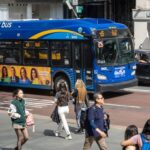Posts tagged with 'fossil fuels'
The built environment is not on track globally to achieve its sectoral climate targets. Accounting for over a third of total energy system emissions already, the continued use of carbon-intensive materials paired with inefficient energy use throughout the built environment ...

On July 22, the world experienced its hottest day in recorded history. The global average temperature reached 17.2 degrees C (62.9 degrees F), prompting UN Secretary-General António Guterres to issue a global call to action on extreme heat. The problem of extreme ...

In the face of rapid urbanization, evolving mobility patterns and the looming climate crisis, the Sustainable Cities Challenge emerges as a pioneering initiative providing a catalytic approach to drive progress. Launched by the Toyota Mobility Foundation in collaboration with WRI ...

In the stylish Grünerløkka neighborhood in Oslo, construction workers are busy rehabilitating Sophies Minde, an old medical clinic, into a new nursery school and maternal health center. Tidy piles of building materials along the perimeter of the construction site wait ...

Like many parts of Africa, motorcycles are the most popular form of transportation among Rwanda’s 13.3 million people. Whether they’re commuting to work or school, transporting jugs of water from the local taps or just running everyday errands, people on ...

At COP28, global climate leaders congregated in Dubai for the annual opportunity to review countries’ progress on emissions reductions and to increase climate ambition. One of the conference’s focal points was how to rapidly and equitably transition away from fossil ...

As electric school buses hit the road across the United States, it’s important for school districts and school transportation providers to prepare for how these clean-running buses will perform in different climates. The good news? Electric school buses are tested ...

Last year shattered global heat records. The world witnessed the effects of rising temperatures in the form of devastating wildfires, severe flooding, extreme heatwaves and more. Poor countries and communities who have contributed the least to causing the climate crisis ...

By David Waskow, Jennifer Layke, Nate Warszawski, Preety Bhandari, Gabrielle Swaby, Natalia Alayza, Jamal Srouji, Mario Julien Díaz, Edward Davey, Rogier van den Berg, Roman Czebiniak, Paige Langer and Nathan Cogswell on December 19, 2023
The COP28 climate talks began with a new fund to address the increasingly severe losses and damage vulnerable countries face from climate impacts and concluded with the first international agreement to tackle climate change’s main driver: fossil fuels. Those bookends to the Dubai summit ...

Public transport is one of the best, most cost-effective solutions available to address today’s climate and development challenges. Buses and trains can reduce greenhouse gas (GHG) emissions by up to two-thirds per passenger, per kilometer compared to private vehicles. The UN’s latest ...

In Asia, 14 countries — accounting for 26% of global transport emissions in 2019 — have made economy-wide net zero commitments. Momentum towards zero-emission transport is growing with countries enhancing ambition and including transport-related targets in their nationally determined contributions (NDCs). However, ...

Residents of Jakarta, Indonesia woke up on August 31, 2023, to a thick blanket of haze and news that their city was again ranked the most polluted in the world — one of many times during the last several months when air quality became ...

By Sophie Boehm, Clea Schumer, Emma Grier, Louise Jeffery, Judit Hecke, Joel Jaeger, Claire Fyson, Kelly Levin, Anna Nilsson, Stephen Naimoli, Joe Thwaites, Katie Lebling, Richard Waite, Jason Collis, Michelle Sims, Neelam Singh, William Lamb, Sebastian Castellanos, Anderson Lee, Marie-Charlotte Geffray, Raychel Santo, Mulubrhan Balehegn, Michael Petroni and Maeve Masterson on November 20, 2023
Today’s climate change headlines often seem at odds with each other. One day, it’s catastrophic wildfires wreaking havoc around the world; the next, it’s an optimistic piece on the rapid scale-up of solar and wind power. Taken together, such stories ...

Public vehicle fleets, which include everything from city buses and school buses to garbage trucks and law enforcement vehicles, make up a significant share of traffic on U.S. roads. There are 645,000 vehicles in the federal fleet, 500,000 in state fleets across the ...

This year is a critical moment for climate action. The mounting impacts of climate change, from floods and droughts to hurricanes and heat waves, are taking a major toll on human lives and economies globally — particularly in vulnerable developing nations ...























